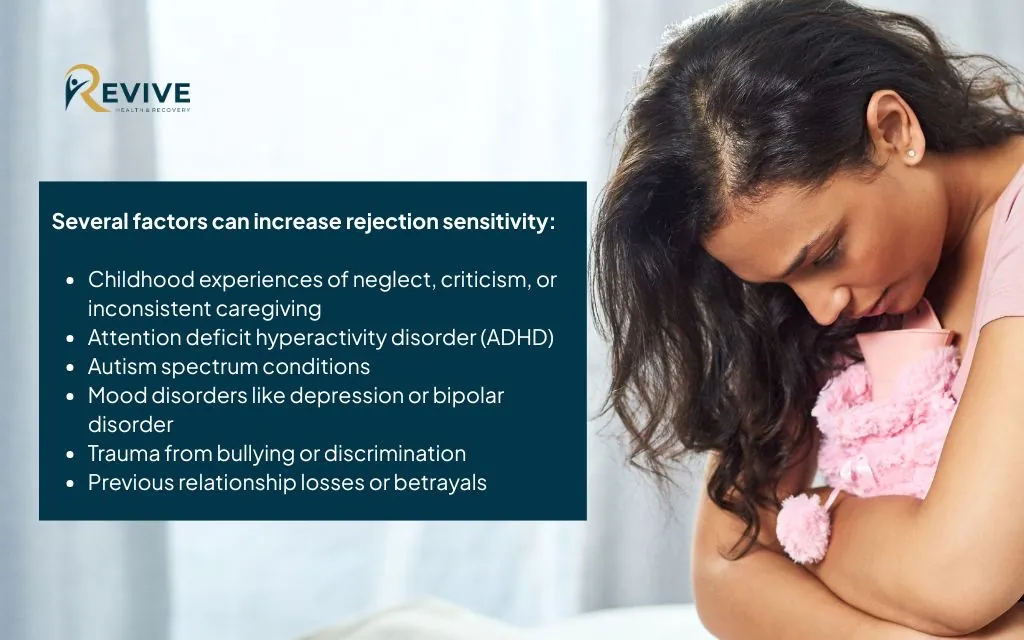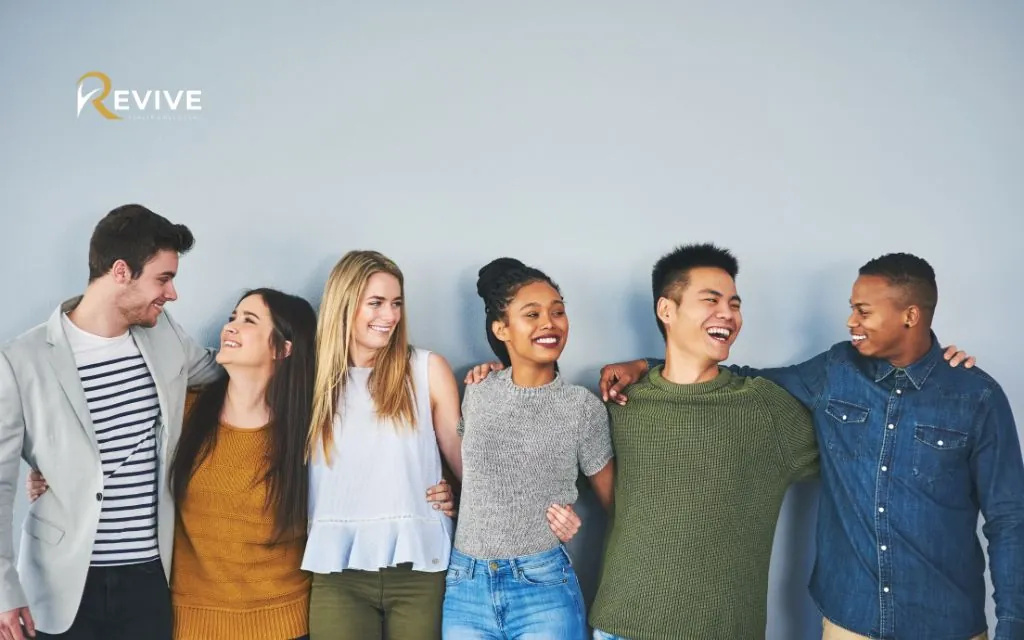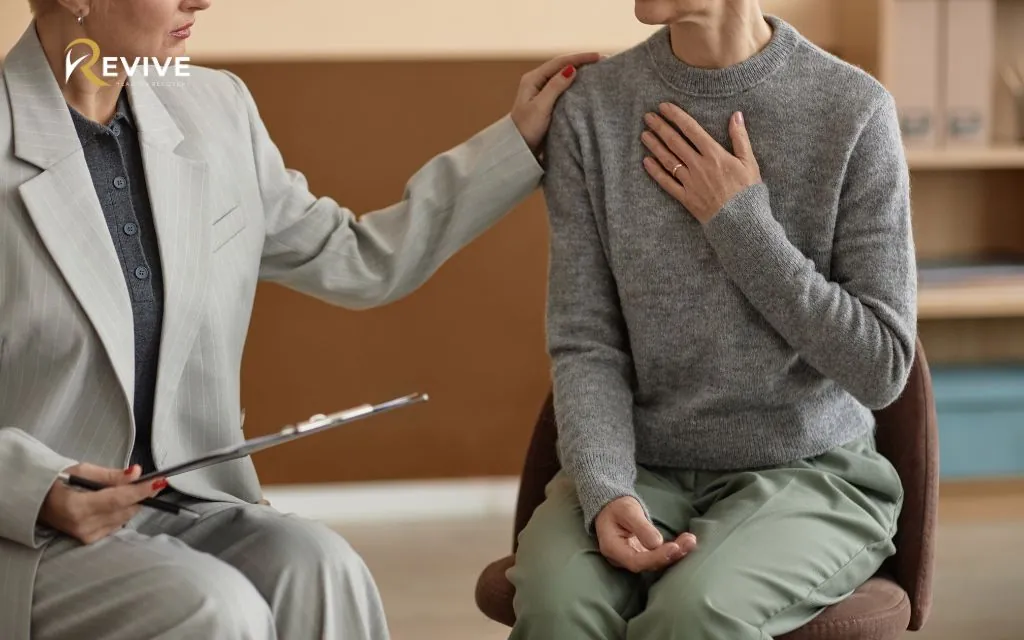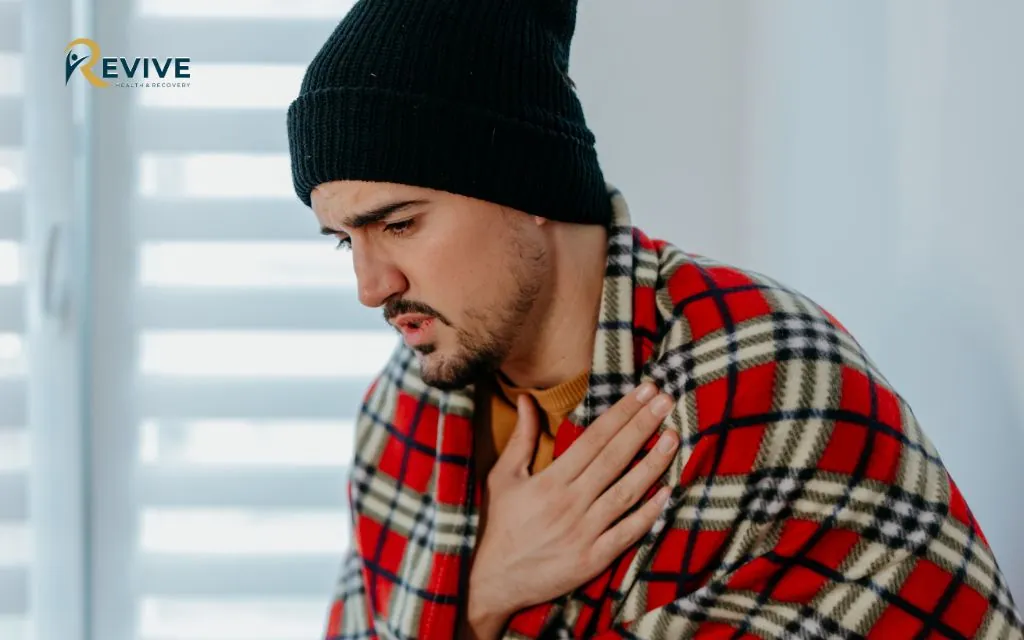Feeling like no one wants you around can be one of the most painful human experiences. This emotional pain isn’t just in your head. Scientific research shows that social rejection activates the same brain regions as physical injury. You’re not being dramatic or oversensitive when you wonder “why do i feel like no one wants me around.” Your brain processes this social pain as a real threat to your wellbeing.
Understanding the science behind these feelings can help you realize that what you’re experiencing has clear psychological and neurological explanations. More importantly, effective treatments exist to help you rebuild social connections and find relief from this emotional suffering.
The science behind feeling unwanted
Neurological basis of social rejection
Your brain treats social rejection like a physical wound. When you feel excluded or unwanted, the anterior cingulate cortex and right ventral prefrontal cortex become active. These same areas light up when you experience physical pain. This explains why phrases like “hurt feelings” or “broken heart” resonate so deeply with human experience.
Mirror neurons, which help us understand others’ emotions and intentions, also play a role in how we interpret social situations. When these systems become oversensitive, you might perceive rejection even in neutral interactions. Evolutionary psychology suggests that humans developed strong social bonding needs because survival depended on group membership. Today, this same system can become hyperactive, making you feel like nobody likes you even when evidence suggests otherwise.

Rejection sensitivity: When social pain becomes overwhelming
Rejection sensitivity dysphoria describes a condition where individuals experience intense emotional reactions to perceived rejection. If you have this sensitivity, you might notice physical symptoms like racing heart, sweating, or nausea when you sense social disapproval. The emotional response often feels disproportionate to the actual situation.
Several factors can increase rejection sensitivity:
- Childhood experiences of neglect, criticism, or inconsistent caregiving
- Attention deficit hyperactivity disorder (ADHD)
- Autism spectrum conditions
- Mood disorders like depression or bipolar disorder
- Trauma from bullying or discrimination
- Previous relationship losses or betrayals
Learning to distinguish between perceived and actual rejection becomes crucial. Your brain might interpret a delayed text response as evidence that “no one wants to be around me.” In reality, the person might simply be busy. Distinguishing between your emotional reactions and objective reality requires practice and often professional support.
The depression-social rejection connection
How depression amplifies feelings of unwantedness
Depression creates cognitive distortions that filter social interactions through a negative lens. When you’re depressed, your brain becomes biased toward interpreting neutral social cues as rejection. A friend’s distracted expression might seem like evidence that they find you boring. A coworker’s brief greeting could feel like proof that nobody wants me around.
Common negative thought patterns include mind reading, fortune telling, and all-or-nothing thinking. Mind reading involves assuming you know what others think without evidence. Fortune telling means predicting rejection before it happens. All-or-nothing thinking creates beliefs like if one person rejects you, everyone will. These cognitive errors feed the cycle of social withdrawal and isolation.
Depression also affects your energy levels and motivation to maintain social connections. You might cancel plans, avoid social media, or stop reaching out to friends. Unfortunately, this withdrawal often creates the very rejection you fear, as relationships naturally fade without mutual effort.
The vicious cycle: Isolation feeding depression
Social isolation creates a self-fulfilling prophecy that reinforces depression. When you withdraw from social contact, you lose opportunities for positive interactions that could challenge negative thoughts. The longer you stay isolated, the more difficult social reentry becomes. Social skills can feel rusty, and anxiety about reconnecting intensifies.
This cycle impacts your self-esteem and confidence in profound ways. Without regular social feedback, you might lose touch with your positive qualities and social value. The voice in your head saying “no one likes me” grows louder without external evidence to contradict it.
Physiologically, chronic social isolation triggers stress responses that worsen depression symptoms. Elevated cortisol levels, disrupted sleep patterns, and weakened immune function all result from prolonged social disconnection. Your body literally responds to loneliness as a threat to survival.
Understanding your social environment
Cultural factors in Colorado’s diverse communities
Colorado’s cultural landscape significantly influences social expectations and rejection sensitivity. If you come from a collectivist cultural background, feeling disconnected from community might feel especially distressing. Your brain’s social needs might differ from those around you, creating a sense that “nobody wants me” when the mismatch is actually cultural.
Urban areas like Denver offer more anonymity but can also increase feelings of social isolation despite being surrounded by people. Rural mountain communities provide closer social networks but can feel restrictive if you don’t fit traditional social patterns. Seasonal affective patterns in Colorado’s high-altitude environment can worsen feelings of social rejection during winter months when reduced sunlight affects serotonin production.
Modern social challenges: Digital age loneliness
Social media paradoxically increases feelings of rejection while providing more connection opportunities. Constant comparison with others’ curated online lives can make your own social reality feel inadequate. Seeing friends together without you triggers primitive rejection responses, even when exclusion wasn’t intentional.
Virtual connections lack the neurochemical benefits of in-person interaction. Video calls and text messages don’t release the same levels of oxytocin and endorphins that face-to-face contact provides. This leaves you feeling emotionally unfulfilled despite maintaining digital relationships.
The COVID-19 pandemic created lasting impacts on social skills and comfort levels. Many people lost confidence in social situations after extended isolation periods. If you feel like your social abilities have declined, you’re experiencing a common adjustment challenge rather than personal failure.
Psychological factors contributing to feeling unwanted
Attachment styles and adult relationships
Your early caregiving experiences create internal working models for adult relationships. Anxious attachment patterns develop from inconsistent caregiving and make you hypersensitive to social threats. You might constantly fear that others will abandon you, leading to behaviors that can push people away.
Avoidant attachment results from emotionally distant caregiving and can make you withdraw preemptively to avoid potential rejection. You might unconsciously create distance in relationships to protect yourself, then interpret others’ respect for that distance as evidence that “nobody likes me.”
Disorganized attachment, often stemming from traumatic early experiences, creates chaotic relationship patterns. You might simultaneously crave and fear social connection, sending mixed signals that confuse potential friends and romantic partners. Breaking these negative relationship cycles requires recognizing your attachment patterns and consciously choosing different responses.

Cognitive biases that distort social reality
Confirmation bias leads you to notice evidence that supports your belief that “no one wants me around” while ignoring contradictory information. If you believe people dislike you, you’ll focus on the one person who didn’t smile back while overlooking five people who greeted you warmly.
Common negative thought patterns include:
- Mind reading: Assuming you know what others think without evidence
- Fortune telling: Predicting rejection before it happens
- All-or-nothing thinking: Believing if one person rejects you, everyone will
- Confirmation bias: Only noticing evidence that supports negative beliefs
When feeling unwanted signals depression
Clinical depression symptoms beyond sadness
Depression extends far beyond feeling sad or crying frequently. Anhedonia, or loss of interest in previously enjoyable activities, can make social interactions feel pointless or exhausting. Changes in appetite, sleep patterns, and energy levels affect your ability to maintain social connections.
| Depression Symptoms | Social Impact |
| Anhedonia | Social activities feel pointless |
| Low energy | Interactions require too much effort |
| Sleep problems | Fatigue affects social motivation |
| Appetite changes | Avoiding social meals or gatherings |
| Concentration issues | Difficulty following conversations |
Suicidal ideation represents a medical emergency requiring immediate professional intervention. If thoughts like “nobody would miss me” or “the world would be better without me” occur frequently, contact a mental health professional immediately or call the National Suicide Prevention Lifeline at 988.
Co-occurring conditions: Anxiety and social phobia
Generalized anxiety disorder often accompanies depression and intensifies social rejection fears. Constant worry about what others think can make every social interaction feel threatening. Physical anxiety symptoms like sweating, trembling, or nausea can make social situations genuinely uncomfortable.
Social anxiety disorder specifically targets social situations with intense fear and avoidance. Unlike general shyness, social anxiety creates significant impairment in daily functioning. Panic disorder can trigger intense physical symptoms during social situations, creating associations between social contact and danger.
Evidence-based treatment approaches
Cognitive behavioral therapy for social rejection
Cognitive Behavioral Therapy helps identify and challenge negative thought patterns that fuel social rejection fears. Your therapist will help you examine evidence for and against thoughts like “nobody wants me around.” This process reveals how cognitive distortions create emotional distress that doesn’t match reality.
Behavioral experiments involve testing your social predictions in real-world situations. If you believe people will reject you at a social gathering, your therapist might help you design an experiment to test this assumption. Often, the reality differs significantly from your predictions. Social skills training provides concrete tools for initiating and maintaining relationships.
Dialectical behavior therapy: Managing emotional intensity
Dialectical Behavior Therapy teaches distress tolerance skills for managing intense emotions when social rejection occurs. These techniques help you survive emotional crises without engaging in behaviors that damage relationships or self-esteem.
Interpersonal effectiveness training provides scripts and strategies for navigating difficult social situations. You’ll learn how to ask for what you need, set boundaries, and maintain relationships even during conflict. Emotion regulation techniques help you identify emotional triggers and develop healthy coping strategies.
Building social connections: Practical strategies
Gradual exposure and social skills building
Start with low-stakes social interactions that feel manageable. Brief conversations with cashiers, neighbors, or coworkers provide practice opportunities without significant emotional investment. Success in these interactions builds confidence for more challenging social situations.
Practice conversation skills in low-pressure environments. Book clubs, hobby groups, or volunteer organizations provide structured social interaction around shared interests. These settings reduce the pressure to be entertaining while offering natural conversation topics. Denver area resources include hiking groups through Colorado Mountain Club, book clubs at local libraries, and volunteer opportunities with organizations like Food Bank of the Rockies.
Self-compassion and internal work
Mindfulness practices help you observe negative thoughts without becoming overwhelmed by them. When the thought “no one likes me” arises, mindfulness allows you to notice it as a thought rather than accepting it as truth. Developing internal validation skills reduces dependence on external approval for self-worth.
Breaking the inner critic’s voice requires recognizing harsh self-talk patterns and developing more balanced internal dialogue. Instead of “nobody wants me around,” you might learn to think “some people might not connect with me, and that’s normal human variation.”
Support resources in Colorado
Professional mental health services in Denver
Colorado offers numerous mental health treatment options, from individual therapy to intensive outpatient programs. Licensed clinical social workers, licensed professional counselors, and psychologists all provide specialized training in depression and social anxiety treatment. When seeking therapy, look for providers with specific experience in cognitive behavioral therapy, dialectical behavior therapy, or interpersonal therapy.
Insurance considerations vary significantly between providers and treatment modalities. Many therapists offer sliding scale fees for clients without insurance coverage. Community mental health centers provide affordable options for those with limited financial resources.
Community support groups and organizations
NAMI Colorado provides peer support groups, educational programs, and advocacy resources for individuals with mental health conditions. Their support groups offer opportunities to connect with others who understand the experience of feeling socially rejected due to mental health challenges.
Local support groups for depression and anxiety meet regularly throughout the Denver metro area. Community centers, churches, and libraries often host social activities designed to combat isolation. Senior centers offer intergenerational programs that welcome participants of all ages seeking social connection.
Why choose Revive Health Recovery for your healing journey
At Revive Health Recovery, we understand the complex relationship between social rejection and mental health. Our specialized depression treatment approaches address the underlying patterns that create feelings of unwantedness while building practical skills for meaningful social connection.
Our compassionate, expert staff includes licensed professionals who recognize that feeling like “nobody wants me around” reflects treatable mental health symptoms rather than personal character flaws. We provide evidence-based therapies including Cognitive Behavioral Therapy, Dialectical Behavior Therapy, and Motivational Interviewing.

Our holistic healing approach addresses the interconnection between mental, physical, and social wellness. As Colorado community members ourselves, we understand the unique cultural and environmental factors that influence mental health in our region. Our accessible, flexible care includes multiple therapy modalities and scheduling options to meet your specific needs.
If you’re tired of feeling like no one wants you around, you don’t have to suffer alone. Contact Revive Health Recovery today to begin your journey toward healing and genuine social connection.
FAQs about question ‘why do i feel like no one wants me around’
Why do I suddenly feel like no one wants me around?
Sudden feelings of social rejection often signal underlying depression, anxiety, or significant life stressors. Brain chemistry changes, hormonal fluctuations, or unprocessed trauma can trigger these feelings. Revive Health Recovery’s assessment process identifies the root causes and develops targeted treatment plans.
Is feeling unwanted always a sign of depression?
Not always, but persistent feelings of social rejection frequently accompany mood disorders. Temporary feelings during life transitions are normal, but chronic patterns warrant professional evaluation. Our Denver-based team helps distinguish between situational loneliness and clinical depression requiring treatment.
How can I tell if my feelings are realistic or distorted by mental health issues?
Objective reality checking involves examining evidence for your social beliefs and considering alternative explanations for others’ behavior. Mental health professionals provide neutral perspectives to help separate emotional reactions from factual observations. Revive Health Recovery specializes in teaching these crucial skills.
What’s the difference between being alone and feeling lonely?
Being alone is a physical state, while loneliness is an emotional experience of disconnection that can occur even in crowded rooms. Quality social connections matter more than quantity. Our therapists help develop meaningful relationships that address emotional needs effectively.
How long does it take to overcome chronic feelings of social rejection?
Recovery timelines vary based on individual factors, but most people notice improvements within 8-12 weeks of consistent therapy. Building lasting social confidence requires ongoing practice and support. Revive Health Recovery provides both short-term symptom relief and long-term relationship skills development.
Conclusion
Feeling like no one wants you around reflects real neurological and psychological processes, not personal weakness or character flaws. Scientific research validates your pain while pointing toward effective treatments that can restore your sense of social belonging and self-worth.
The journey from social isolation to meaningful connection requires professional support, practical skills development, and patience with the healing process. You deserve relationships that value your unique qualities and provide genuine emotional support.
Don’t let another day pass believing that nobody wants you around. Reach out to Revive Health Recovery today to begin rebuilding your social confidence and creating the connections your heart needs. Call us at (303) 268-4655, email contact@revivehealthrecovery.com, or visit our Denver location at 1427 S Federal Blvd. Our team is available 24/7 to support your healing journey.
Remember: feeling unwanted is a temporary experience that responds well to professional treatment. With the right support, you can develop lasting social connections and rediscover your inherent worth as a valued member of your community.



